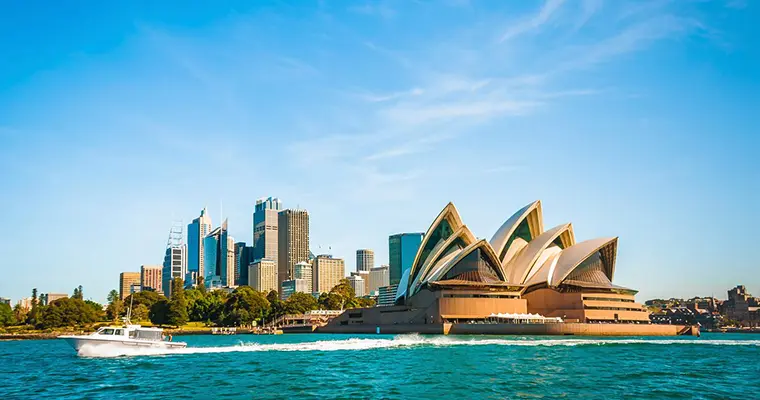New Zealand

New Zealand has become one of the leading choices for students who want to study in New Zealand from Nepal and receive a high-quality education along with meaningful opportunities beyond the classroom. What draws thousands of international students each year is not only its respected academic qualifications and reasonable costs but also its dedication to fostering skills through practical learning and offering a secure, inclusive environment.
For students from Nepal, choosing to study in New Zealand means accessing diverse academic programs tailored to global industry needs, flexible work study options to support living expenses, and a straightforward visa process designed to ease the transition. Whether you want to pursue technology, business, healthcare, or the creative arts, New Zealand’s education system equips you with practical skills and a competitive edge, making your study abroad experience a stepping stone to success.
Why Choose New Zealand for Your Studies?
- Research Institutions and Courses: Explore New Zealand universities and polytechnics that offer courses aligning with your academic goals.
- Prepare Required Documents: Gather academic transcripts, English proficiency test scores, personal statements, and letters of recommendation.
- Submit Applications: Apply directly to your chosen institutions through their online portals.
- Receive an Offer: Upon acceptance, you'll receive an Offer of Place, which is needed to apply for a student visa.
- Apply for a Student Visa: Use your Offer of Place to apply for a student visa, meeting all necessary health, financial, and character requirements.
- Plan for Arrival: Arrange accommodation, health insurance, and other essentials before arriving in New Zealand.
Cost of Studying in New Zealand
Living in New Zealand as a student is relatively affordable compared to other popular study destinations. Students should budget for accommodation, food, transportation, and personal expenses, typically ranging from NZD 15,000 to NZD 20,000 per year, depending on the city and lifestyle. Study in New Zealand is affordable compared to many other countries.
|
S.N |
Expense |
Approximate Cost |
|
1 |
Tuition Fees (Per Year) |
NZD 22,000–35,000 (Undergraduate) |
|
2 |
Living Costs (Per Month) |
NZD 1,500–2,000 |
|
3 |
Health Insurance |
NZD 300–700 per year |
- Academic Requirements: A strong academic record from previous studies is essential.
- English Proficiency: Proof of English language proficiency, usually demonstrated through IELTS, TOEFL, or similar exams.
- Personal Statement: A detailed statement of purpose outlining your academic interests, career goals, and reasons for choosing New Zealand.
- Letters of Recommendation: Academic or professional references supporting your application.
- Specific Program Requirements: Some programs may have additional requirements such as portfolios or interviews.
- Visa Requirements: Obtain a student visa, ensuring compliance with health, character, and financial criteria.
- New Zealand ranks 7th globally in the Programme for International Student Assessment (PISA) for educational quality.
- The country is home to the world’s steepest residential street, Baldwin Street, in Dunedin.
- New Zealand was the first country to grant women the right to vote in 1893.
- The stunning landscapes of New Zealand served as the filming locations for the famous "Lord of the Rings" trilogy.
Top Universities in New Zealand
Here’s a quick overview of some of the best universities:
|
S.N |
University |
Location |
Specialties |
Global Ranking |
|
1 |
University of Auckland |
Auckland |
Engineering, Medicine, Business |
Top 100 |
|
2 |
University of Otago |
Dunedin |
Health Sciences, Humanities, Law |
Top 200 |
|
3 |
Victoria University |
Wellington |
Arts, Education, Environmental Studies |
Top 300 |
|
4 |
Massey University |
Multiple campuses |
Agriculture, Veterinary Science, Design |
Top 300 |
Visa and Application Process to study in New Zealand
Getting a student visa is an important step. Here’s a simple process:
- Choose your course and get an offer letter from a university.
- Gather documents like your passport, academic records, and proof of funds.
- Apply for a student visa online through the New Zealand Immigration website.
- Attend a visa interview (if required).
- Wait for your visa approval. Follow these steps to apply for your visa:
- Step 1: Choose Your Course and Institution
- Research and select a program at a recognized institution. Check that your school is on the list of approved providers by the New Zealand Qualifications Authority (NZQA).
- Step 2: Gather Required Documents
- You’ll need to collect documents like:
- Your passport
- Proof of funds (bank statements, sponsorship letters, etc.)
- Your offer letter from the New Zealand institution
- Academic transcripts and certificates
- Health and police clearance (if needed)
- You’ll need to collect documents like:
- Step 3: Apply Online
- Visit the Immigration New Zealand (INZ) website and fill out your visa application form online.
- You can also apply on paper if needed but online is usually faster.
- Step 4: Pay Visa Fees
- After filling out the application, you’ll need to pay the visa application fee. Check the INZ website for the current fee and payment options.
- Step 5: Wait for Processing
- Visa processing can take anywhere from a few weeks to a couple of months. The waiting time depends on factors like the type of visa and the country you’re applying from.
- Step 6: Visa Approval & Travel
- Once your visa is approved, you’ll receive a confirmation. You can now plan your travel to New Zealand!
1. Can You Work on a Student Visa in New Zealand?
Before you start working, it’s essential to understand whether your student visa allows you to take up employment. The good news is that most student visas in New Zealand permit part-time work, provided you meet specific conditions:
- Eligibility Criteria:
- You must be enrolled in a full-time program at a recognized institution.
- Your course should meet Immigration New Zealand’s requirements, such as being at least two years long or leading to a qualification that gains points under the Skilled Migrant Category.
- Work Limitations:
- You are generally allowed to work up to 20 hours per week during the academic term.
- You can work full-time during scheduled breaks or holidays (up to 40 hours per week).
Staying within these limits is important, as violations can lead to penalties, including visa cancellations.
2. Types of Work Opportunities for Students
There are plenty of part-time jobs available for international students in New Zealand. These jobs help cover living expenses and provide valuable work experience.
- Part-time Work During Studies:
Jobs suitable for students include:- Retail (sales assistant roles in shops and malls).
- Hospitality (working in cafés, restaurants, or hotels).
- Tutoring (helping younger students or peers in academic subjects).
- Full-time Work During Holidays:
During holidays or semester breaks, you can take up full-time roles such as:- Seasonal jobs like fruit picking in orchards.
- Temporary office or administrative work.
These jobs are often flexible and provide opportunities to explore the country while earning. For guidance on finding part-time or full-time work opportunities, visit Pathfinder Int's Education Consultancy.




